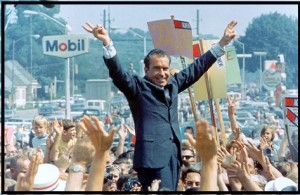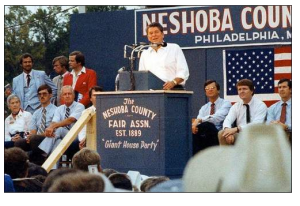———-
Former President George H.W. Bush is being fondly remembered as a man of character and kindness, a president who certainly made serious mistakes (don’t they all), but one who also exercised power with – to use one of his favorite words – “prudence.” The remembrances make the contrast between the late president and the current one all the more stark.

Washington Post columnist Max Boot, a fierce critic of Donald Trump and author of a scathing critique of the modern Republican Party called The Corrosion of Conservatism, wonders “how, in the space of a quarter-century, did we go from President Bush to President Trump?” The answer is complicated, as one suspects Bush 41 understood. He could be a self-reflective president, unlike the current one.
Mr. Rogers and John Wayne…
The comedian Dana Carvey made a mini-career of impersonating Bush on Saturday Night Live, exaggerating the preppy president’s gestures and speech for comic effect.
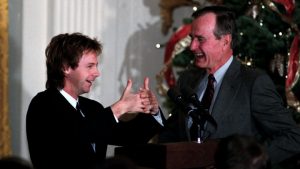
After hearing of Bush’s death, I watched Carvey’s surprise White House appearance toward the very end of his presidency – H.W. had just lost to Bill Clinton – and came away thinking it takes a comedian to begin to understand the ying and yang of Bush. The 41st president was a genuinely brave Naval aviator, an aristocratic New Englander remade into a Texas oil man, a failed Senate candidate, a fierce partisan, a CIA director, a loyal vice president and a man who ruined his presidency by doing the right thing.
Perhaps Bush should have known that a new breed of Republican disrupters – read Newt Gingrich – would never cut him slack for raising taxes in service of reducing the deficit. Unlike the rest of the GOP, Bush never forgot that cutting taxes almost always leads to bigger deficits. Voodoo economics is not fake news. The moment marked a turning point away from responsible, bipartisan governing.
Carvey said his Bush voice was a mixture of Mr. Rogers – “it’s a beautiful day in the neighborhood” – and John Wayne, a certain clipped, confident shorthand that often saw Bush mangle a phrase, but still convey his essential meaning. In a way Bush governed – evidence of his better angels – like Fred Rogers. He was prudent, careful and kind. He signed the Americans with Disability Act, a landmark piece of legislation that showed the country and its politics at its best. Bush, surrounded by adults like James Baker and Brent Scowcroft, presided over a peaceful end of the Cold War, a moment we now take for granted that might have gone horribly wrong. Bush knew that an international coalition was needed to kick Saddam Hussein out of Kuwait and also knew that a contained Saddam, as thuggishly brutal as his regime was, was better for the region than the decades of turmoil his son unleashed by engaging in regime change.
Prudent isn’t a bad epitaph.
But, if Bush governed like the essentially decent, pragmatic, mostly moderate Republican he was, he campaigned as something else. After losing the GOP nomination to Ronald Reagan in 1980, Bush embraced, or at least accepted, the sharp, divisive, negative style that came out of the election cycle. We remember the Reagan landslide (with Bush as his vice president) as a major turning point in American politics, but that election also featured the first widespread use of the independent expenditure campaign. Exploiting the liberalization of campaign finance limits, independent campaigns went on the attack in a major way in 1980. Reagan benefited, but so did a new generation of political operatives, including Paul Manafort, Roger Ailes, Roger Stone and Lee Atwater. Their essential negative tactics, constructed of fear, division and, yes, racism, continue to shape GOP campaigns, conservative media and the current occupant of the White House.
When Bush got his own shot at the White House in 1988 he campaigned like John Wayne, all American flag factories, assaults on the ACLU and race baiting with the infamous Willie Horton references. Horton, an African-American convicted of murder, raped a white woman and stabbed her partner while on prison furlough, a program in place in Massachusetts when Bush’s opponent, Governor Michael Dukakis, was in office.
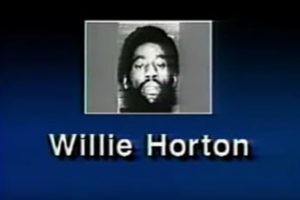
Technically the Bush campaign didn’t run the “Willie Horton ad,” but left that dirty work to something called the National Security Political Action Committee, an independent expenditure campaign supposedly independent of the Bush campaign. Bush did, however, repeatedly invoke Horton on the stump and Atwater, his campaign manager, really did say: “If we can make Willie Horton a household name, we’ll win the election.”
Bush insisted to his biographer Jon Meacham that the references to Horton and the furlough issue were about Dukakis being soft on crime and none of it was meant as a race-based “dog whistle” to fire up the increasingly white base of the Republican Party. Yet as Meacham notes, “In truth, in the tangled politics of that difficult year, as so often in American life, [the references] ended up being about both.”
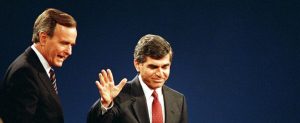
Dukakis, of course, was a perfectly awful candidate – remember him riding around in a tank with a funny looking helmet – and Bush won that election decisively, if not altogether honorably. Bush recorded in his diary, as Meacham reports, that critics would long complain that he had taken the low road to the White House. Bush, ever the pragmatist, wrote simply: “I don’t know what we could do differently. We had to define this guy [Dukakis].”
When the pragmatic Bush tried to compromise with a tax and budget deal his “prudent” approach was rejected by many in his party, none less than Gingrich, who cared less about governing and the nation’s future than he did about a generation of political power for the political right. It’s ironic that while people across the political spectrum praise Bush’s style and basic decency, one of his signature accomplishments – the North America Free Trade Agreement (NAFTA) – is daily trashed by the current non-governing Republican Party. In the end, Bush – Willie Horton and all – was too much the pragmatist, too much a pro, too much a policy wonk for a party owned now for a man as far removed from Bush as decency is removed from vulgarity.
———
“How different is Trump’s Republican party from Bush 41’s? George H. W. Bush signed the Americans With Disability Act in 1991. Donald Trump mocks the disabled. George H. W. Bush summoned a coalition of 35 countries for the first Gulf War. Donald Trump attacks even our closest allies, England and Canada, and talks about NATO like it was a deadbeat tenant. President Bush negotiated the original North American Free Trade Agreement. Donald Trump calls Mexicans ‘rapists’ and brags he has ordered armed U.S. troops to respond with deadly force to brown people throwing rocks at the border. George H. W. Bush celebrated charity and kindness. Donald Trump mocks a ‘thousand points of light.’ George H. W. Bush enlisted at 18, the Navy’s youngest pilot, in civilization’s last great battle against tyranny. Donald Trump dodged military service multiple times, celebrates tyrants and defends Nazi’s as ‘good people on both sides.’”
– Republican strategist Stewart Stevens
———
Thinking about George H.W. Bush I’m reminded of the words of the great British historian Julian Jackson, author of a marvelous biography of “le grand Charles” De Gaulle. “All biographers,” Jackson writes, “must guard against the temptation to impose excessive coherence on their subject.” And so it is with the 41stAmerican president.
A Man in Full…
Let’s remember Bush then as a man in full, a Mr. Rogers with a John Wayne side.
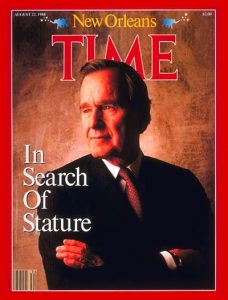
By all accounts Bush loved being president and he was at his best when making friends. As the greatest political journalist of our age, Richard Ben Cramer, wrote in one of the best political books of our age, What It Takes, Bush was once asked what made him think he could be President? The answer: “Well, I’ve got a big family, and lots of friends.” Indeed he did and I for one won’t quibble with the statement that his was the most successful one-term presidency in American history. It would be prudent.
But the man also badly, badly wanted a second term in 1992 and was willing, as Cramer wrote to do what he had to do to win. Bush actually told interviewer David Frost that he would, in fact, do anything – whatever it took – to win again. Bill Clinton and Ross Perot had different ideas and Bush lost.
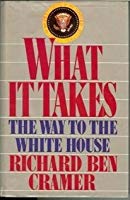
And we are left to wonder how we got from the man with all those friends, the guy who wrote the thousands of thank you notes and befriended, of all people, his old opponent Bill Clinton, the prudent guy, how we got from that guy to this guy.
Part of the answer has to be that leaders of the Republican Party, as well as the conservative media echo chamber created by the likes of Rush Limbaugh and Roger Ailes, have been telling their supporters, at least since Bush 41, that compromise is bad, moderation is capitulation, Democrats are evil and that fear tactics in the service of winning elections are acceptable, indeed necessary. Part of the answer is also that the Republican Party has now fully bought the Trumpian notion that politics is about “feeding the angriest instincts of his base.”
So much for Mr. Rogers.
It is a complicated story and the man being remembered this week was, too.
—0—




